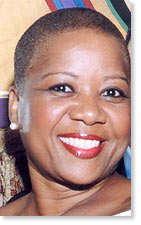|
Teen Mother, My Mother
"... opening doors to real dialogue that break the silence, and dispelling myths about sex and sexuality." Leslie M. Watson Washington, D.C.
I am my mother's child. The one she told one day many years ago, as I laid on a hospital table that, "God did not intend for your life to be like mine!" The forms had been signed and I was tearfully rolled into the very cold, unfriendly operating room. It was 1974, one year after the landmark decision Roe v. Wade legalized abortion. I was fourteen and my mother was twenty-eight, on welfare with five other children. Fourteen at the time of my birth, she was what we now call "an unwed teen mother." On this day, at that moment, the decision was not about legislation or white men in suits far away. It was not about the doctor, the nurse, or the technicians. It was just the two of us and God. Since that day, my life has been filled with many highs and lows. Growing up in an abusive home and surviving abusive relationships tested my faith in the Almighty and the words spoken by my mother. However, I recently came to realize that my entire life has been a spiritual preparation for where I am today and the issues on which I work. On January 22, 1998, I was offered the position of Director of The Multicultural Programs Department of the Religious Coalition for Reproductive Choice. The organization, as was the pro-choice movement, was celebrating victories and reflecting on the loss of comrades in the struggle to keep abortion legal, safe and accessible. In my interview, Reverend Carlton Veazey, an African American clergy and President of the Religious Coalition, shared with me his vision for what is now called The Black Church Initiative, a three year program developed to assist African American clergy in addressing teen pregnancy, sexuality and reproductive health issues within the context of African American religion and culture. As he talked, I thought about my mother praying for me and my spiritual experience as a Christian. Many times I've called upon the God of my mother, grandmother and great grandmother. My faith is built upon the faith of those women who believed, unfalteringly that there was no disconnect between religion, women's lives and life choices. God's unchanging hand was always present and now He was presenting me with an opportunity as a lay person to facilitate a process that could ultimately shake the African American religious community at its very foundation. Through the Religious Coalition, I was being offered a chance to faithfully witness to clergy the life importance of open dialogue to prevent teen pregnancy. It was just the two of us and God. Throughout the year, I often pause to reflect upon the choices I have made. I celebrate the joy I have because of my relationship with my mother and the personal affirmation I've gained by working with clergy through The Black Church Initiative. Many of us know the African proverb, "it takes a village to raise a child." However, most teen parents are unmarried and have not completed high school; are unable to earn a livable wage; are less likely to receive prenatal care or be emotionally or spiritually prepared for the lifelong responsibility of parenting. Certainly, we must recognize the need to first provide a spiritual healing for the village. Then we can raise, as a village, a wanted child. It is just us - the village and God. In 1974 my mother said know, not no to me. She knew I was not prepared for motherhood. When folks say it is the norm for women under age 20 to become pregnant, or that they are tired of seeing babies pushing baby carriages, I think about my mother and I wonder when was the last time they listened to hip hop music or look through articles in teen magazines with their daughter, niece, or little sister. The subliminal messages are clear and influential in media: sex and being sexy is part of the rite of passage to adulthood. Now, I know that rites of passage do not include the ability to impregnate or become pregnant. Rites of passage are a preparation for the celebration of adulthood as is motherhood. That historic day in 1974 was the first step for me and my mother. That day we broke the silence around sex and began a dialogue that was healthy, and based in faith and in reality. This year I truly celebrate motherhood, from Eve to Mary to Mildred, my best friend and mother who told me I "was going to be somebody." Mom, know that I am doing my best by remembering your words and learning from your example. I am assisting teens, parents and faith leaders, opening doors to real dialogue that break the silence, and dispelling myths about sex and sexuality. This month and every day of my life I give thanks to my mother for the chance to be who I am - prayerfully, faithfully, pro-choice. |
||||||
|
Published in In Motion Magazine - January 13, 1998.
|
||||||
If you have any thoughts on this or would like to contribute to an ongoing discussion in the  What is New? || Affirmative Action || Art Changes || Autonomy: Chiapas - California || Community Images || Education Rights || E-mail, Opinions and Discussion || En español || Essays from Ireland || Global Eyes || Healthcare || Human Rights/Civil Rights || Piri Thomas || Photo of the Week || QA: Interviews || Region || Rural America || Search || Donate || To be notified of new articles || Survey || In Motion Magazine's Store || In Motion Magazine Staff || In Unity Book of Photos || Links Around The World NPC Productions Copyright © 1995-2020 NPC Productions as a compilation. All Rights Reserved. |


